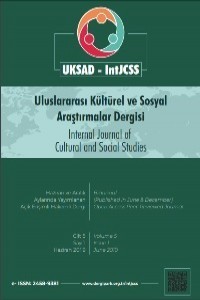Öz
Kaynakça
- Aksan M. & Aksan Y. (2012). “To Emote a Feeling or to Feel an Emotion”, in Paul A. Wilson (ed.) Dynamicity in Emotion Concepts. Vol. 27, 285~304, Frankfurt: Peter Lang.
- Birch, Charles (1995). Feelings. Sydney: University of South Wales Press.
- Doi, Takeo (1981). The Anatomy of Dependence. Tokyo, Kodansha.
- Goddard, Cliff (1991). “Anger in the Western Desert: a case study in the cross-cultural semantic of emotions”, Man 26, pp. 265-279.Goddard, Cliff (1996). “The social emotions of Malay(Bahasa Maleyu)”, Ethos 24, pp. 425-464.
- Harkins Jean, Wierzbicka Anna (2001). “Emotions in Crosslinguistic Perspective”, Cognitive Linguistics Research 17. Berlin · New York: Mouton de Gruyter.
- Karadag, Ozay (2013). “Emotional Intelligence Functions of Turkish Proverbs”, Social Behavior and Personality, 41(2), pp. 295-310.
- Lutz, Catharine (1988). Unnatural Emotions; Everyday Sentiments on a Micronesian Atoll and Their Challenge to Western Theory. Chicago: University of Chicago Press.
- Needham, Rodney (1981). Circumstantial Deliveries. Berkeley: University of California Press.
- Plutchik, Robert (1962). The Emotions: Facts, theories and a new model. New York: Random House.
- Plutchik, Robert (2002). Emotions and life: perspectives from psychology, biology, and evolution, Washington, DC : American Psychological Association
- Russel James A. (1991). “Culture and the categorization of emotions”. Psychological Bulletins 110, 426~450.
- Russell, James A. (1980), “A Circumplex Model of Affect”, Journal of Personality and Social Psychology, vol. 39, no. 6 pp. 1161-1178.
- Smith, Turk Seyda & Smith, Kyle D. (1995). “Turkish Emotion Concepts: A Prototype Approach”, J. A. Russell et al (eds.) Everyday Conceptions of Emotions, pp. 103-119.
- Wierzbicka, Anna (1986). “Human Emotions: Universal or Culture-Specific?”, American Anthropologist 88(3), pp. 584-594.
- Wierzbicka, Anna (1991). Cross-Cultural Semantics. The Semantics of Human Interaction. Berlin: Mouton de Gruyter.
- Wierzbicka, Anna (1999). “Emotional Universals”. Language design: journal of theoretical and experimental linguistics 2, pp. 23-69Günay, V. Dogan (2007). Sözcük Bilime Giriş(Introduction to Lexicology). Multilingual.
- Hirik, Erkan (2017). “Türkiye Türkçesi Duyu Fiillerinde Anlam ve Kelime Sıklığı İlişkişi(Relation of Meanings and Frequency in Perception Verbs in Turkish)”, SUTAD, (41): 53-74.
Öz
Bu çalışmada duygu
sözcüklerinin etnik ve kültür merkezli kelimeler oluşu ve bu konuyla ilgili
farklı kültürlerde gerçekleştirilmiş başlıca çalışmalar tanıtılmaktadır. Ayrıca
bu konu ile alakalı olarak araştırmada Türkçe’de duygu belirten spesifik bir
fiil olan ‘sıkılmak’ fiili tanıtılarak İngilizce açıklanmak kaidesiyle
Korece’deki karşılıkları, Korece Dil Enstitüsü resmi sözlüğündeki anlamları
temel alınarak, gösterilmektedir. Çalışmada kullanılan örnek cümleler ise
korpus aracılığıyla seçilmiş olup tamamen sosyal dilde kullanılan halleriyle
sergilenmiştir. Sonuç olarak iki dil arasındaki duygu belirten kelimelerin
kullanım farklılıkları göz önüne alınarak dil eğitiminde kullanılabilecek bazı
tavsiyelerde bulunulmaktadır.
Anahtar Kelimeler
Kaynakça
- Aksan M. & Aksan Y. (2012). “To Emote a Feeling or to Feel an Emotion”, in Paul A. Wilson (ed.) Dynamicity in Emotion Concepts. Vol. 27, 285~304, Frankfurt: Peter Lang.
- Birch, Charles (1995). Feelings. Sydney: University of South Wales Press.
- Doi, Takeo (1981). The Anatomy of Dependence. Tokyo, Kodansha.
- Goddard, Cliff (1991). “Anger in the Western Desert: a case study in the cross-cultural semantic of emotions”, Man 26, pp. 265-279.Goddard, Cliff (1996). “The social emotions of Malay(Bahasa Maleyu)”, Ethos 24, pp. 425-464.
- Harkins Jean, Wierzbicka Anna (2001). “Emotions in Crosslinguistic Perspective”, Cognitive Linguistics Research 17. Berlin · New York: Mouton de Gruyter.
- Karadag, Ozay (2013). “Emotional Intelligence Functions of Turkish Proverbs”, Social Behavior and Personality, 41(2), pp. 295-310.
- Lutz, Catharine (1988). Unnatural Emotions; Everyday Sentiments on a Micronesian Atoll and Their Challenge to Western Theory. Chicago: University of Chicago Press.
- Needham, Rodney (1981). Circumstantial Deliveries. Berkeley: University of California Press.
- Plutchik, Robert (1962). The Emotions: Facts, theories and a new model. New York: Random House.
- Plutchik, Robert (2002). Emotions and life: perspectives from psychology, biology, and evolution, Washington, DC : American Psychological Association
- Russel James A. (1991). “Culture and the categorization of emotions”. Psychological Bulletins 110, 426~450.
- Russell, James A. (1980), “A Circumplex Model of Affect”, Journal of Personality and Social Psychology, vol. 39, no. 6 pp. 1161-1178.
- Smith, Turk Seyda & Smith, Kyle D. (1995). “Turkish Emotion Concepts: A Prototype Approach”, J. A. Russell et al (eds.) Everyday Conceptions of Emotions, pp. 103-119.
- Wierzbicka, Anna (1986). “Human Emotions: Universal or Culture-Specific?”, American Anthropologist 88(3), pp. 584-594.
- Wierzbicka, Anna (1991). Cross-Cultural Semantics. The Semantics of Human Interaction. Berlin: Mouton de Gruyter.
- Wierzbicka, Anna (1999). “Emotional Universals”. Language design: journal of theoretical and experimental linguistics 2, pp. 23-69Günay, V. Dogan (2007). Sözcük Bilime Giriş(Introduction to Lexicology). Multilingual.
- Hirik, Erkan (2017). “Türkiye Türkçesi Duyu Fiillerinde Anlam ve Kelime Sıklığı İlişkişi(Relation of Meanings and Frequency in Perception Verbs in Turkish)”, SUTAD, (41): 53-74.
Ayrıntılar
| Birincil Dil | İngilizce |
|---|---|
| Konular | Dilbilim |
| Bölüm | Araştırma |
| Yazarlar | |
| Yayımlanma Tarihi | 30 Haziran 2019 |
| Gönderilme Tarihi | 2 Nisan 2019 |
| Kabul Tarihi | 18 Mayıs 2019 |
| Yayımlandığı Sayı | Yıl 2019 Cilt: 5 Sayı: 1 |
Uluslararası Kültürel ve Sosyal Araştırmalar Dergisi


